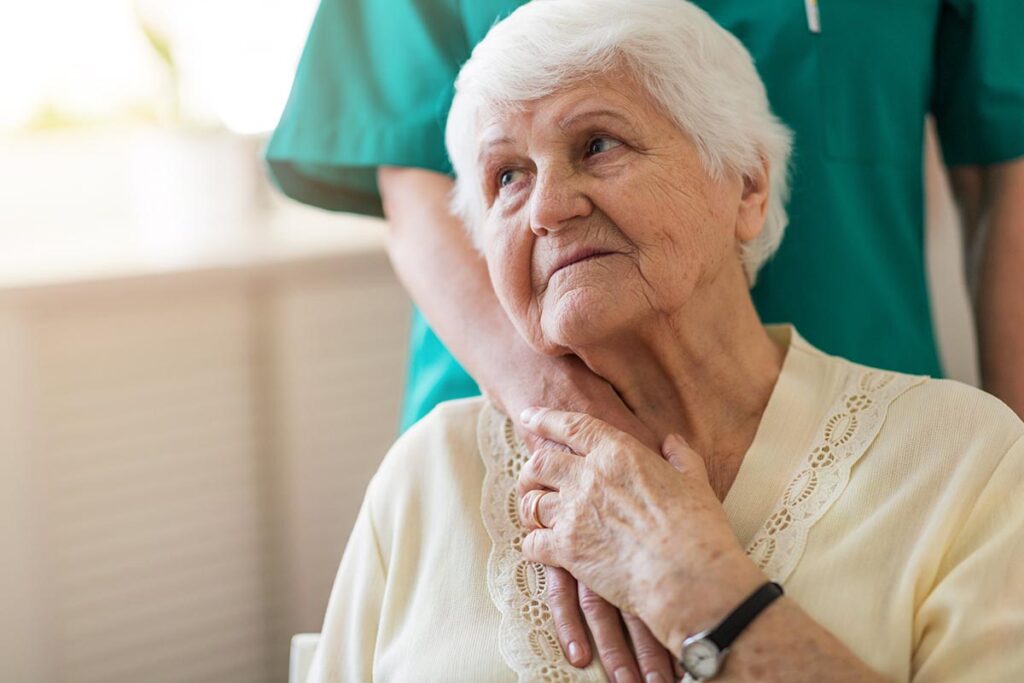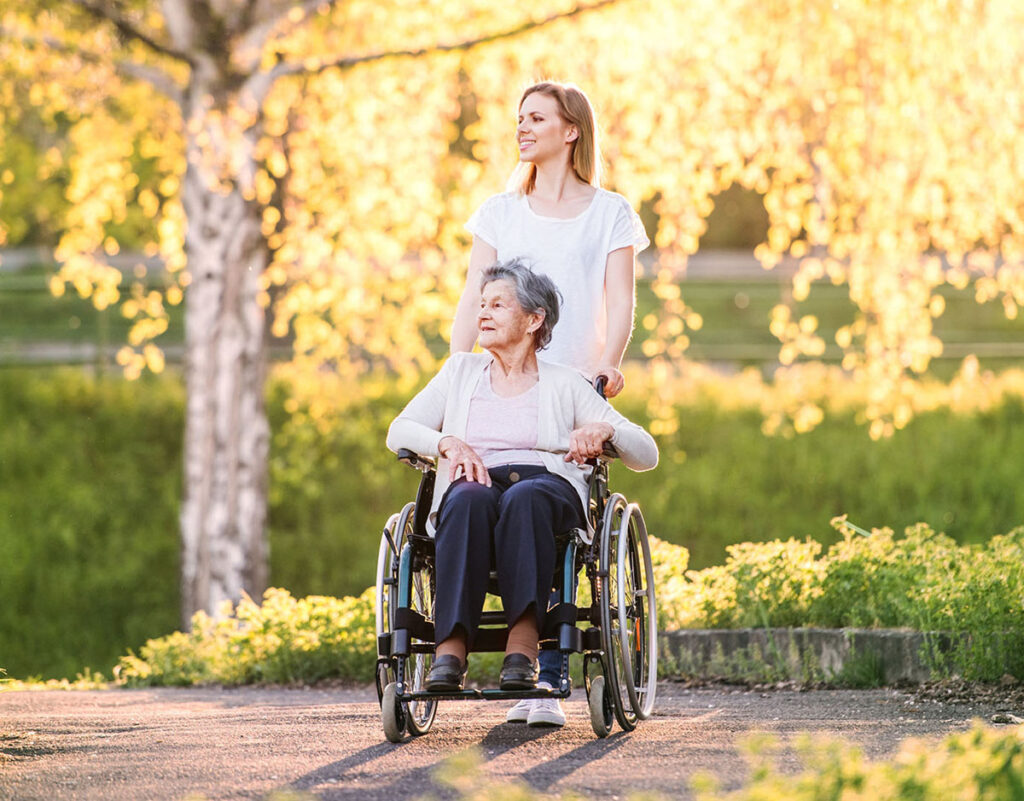What is Personal Care?
Personal care in health and social care covers professional support in everyday private living tasks, such as getting out of bed, maintaining oral hygiene, showering, toileting, dressing, shaving, and much more. Unlike residential care, a trained personal carer provides person-centred assistance in the individual’s home, allowing them to stay close to their family.
The individual’s privacy and dignity are of the utmost importance for personal carers. Care providers are here to support you on your terms and help you achieve your desired routines. For example, if a client wants to shower strictly in the morning or before bed, the support worker will follow their preferred schedule.
In addition to that, personal carers are trained in medication management and handling behaviours that may be challenging. They should be able to recognise triggers, understand challenging behaviours as a way for neurodivergent individuals to communicate their needs, and manage complex situations in accordance with the PBS (positive behaviour support) framework.
What are Personal Care Services?
Personal care services include on-hand assistance with everyday instrumental activities and tasks that the person cannot complete independently. These services allow individuals with complex care needs to keep their tenancy and stay close to their family rather than transfer to a registered care home.
Personal care packages are tailored to the person’s individual requirements. Before taking on a new client, the carer needs to outline a personalised care plan based on consultations with their family members, GP, or social worker.
Personal care includes the following services:
- Support with getting out of bed and walking to strategic places in the house
- Assistance with maintaining personal hygiene, including oral hygiene, washing, bathing, and dressing
- Help with maintaining personal appearance (shaving, grooming, haircare, skincare)
- Assistance with toileting and handling incontinence
- Assistance with household chores, such as cooking meals, cleaning, and doing the laundry
- Obtaining and administering medication
What is a Personal Care Plan?
Before starting their services, personal carers should get to know their new client closely. A personal care plan includes the individual’s general likes and dislikes, personal routine, preferred food and hygiene products. Furthermore, the support worker must pay special attention to the client’s physical and mental state, including prescribed medications, possible allergies, and triggers for challenging behaviours.
Each care provider is trained to prioritise the comfort of the person they support and respect their boundaries. Although the support worker has an outlined home care plan, some conditions may change in accordance with your current needs. As you progress and learn new skills, the carer will encourage your new-found agency and give you space to complete tasks on your own whenever possible.
Personal Care Options
Personal care services are commonly associated with older people who need special assistance in their daily life. However, personal carers can help individuals at any age who struggle with everyday activities due to a learning disability, mental health condition, chronic illness, or recent surgery.
Depending on your loved one’s specific health needs and preferences, you may consider several personal care options. Below are listed the most common types of personal care and the benefits they bring to clients.
Visiting Care
Visiting care, also known as domiciliary care, is a service for people who may need additional support to live independently. The client receives regular visits from a carer who helps them cope with everyday activities, such as maintaining personal hygiene, going to the toilet, or doing laundry. Practitioners in visiting care services are usually equipped to support individuals with medical conditions and post-operative needs.
Live-in Care
Unlike visiting care, live-in care is a 24/7 service with the carer living in the client’s home and offering round-the-clock support. Live-in care allows people with particularly complex health needs to keep their tenancy and receive specialist support while staying close to their families. Live-in carers always prioritise the individual’s dignity, comfort, and independence.
Respite Care
Respite care services provide much-needed relief for primary caregivers. Caring for a child, spouse, parent, or friend with complex needs is a 24-hour job with many challenges. Respite care offers these individuals a temporary break to tend to their needs while trained care providers assist their loved ones. Depending on the caregiver’s requirements, this break can last from a few days to several weeks.
Elderly Care
Elderly care services cover all kinds of professional care for older people who cannot cope with everyday activities independently. Personal care for older people includes specialist assistance with personal hygiene, medication management, transportation, and meal preparation according to the person’s health needs. Carers in this sector are equipped to support individuals with complex medical conditions, such as diabetes, dementia, Alzheimer’s disease, and Parkinson’s disease.
Why Do People Require Personal Care Services?
A person may need personal care for various reasons related to their physical or mental health. For instance, children and young adults mostly require support with everyday activities due to learning disabilities and neurodevelopmental conditions that hinder their agency and social inclusion. Furthermore, mental health issues (such as depression, anxiety, OCD, and agoraphobia) may render the individual uninterested in completing essential self-care tasks or leaving their own home.

Older people are another group that may require personal care services due to a variety of health needs. A professional care provider in elderly care can support older individuals with dementia, diabetes, arthritis, and other chronic or terminal illnesses. Personal care services allow people to spend their old age close to their families, with all their needs fulfilled and their boundaries respected.
The duration and frequency of the personal care service depend on the person’s individual needs. Some clients could only need a few short visits a week, while others might require the carer to live in their home and provide care around the clock.
What Is a Personal Care Assistant?
Professional personal care at home is delivered by paid support workers known as personal care assistants. Each personal care assistant goes through compulsory training to ensure they can provide quality care to individuals with complex needs. The training covers acquiring various skills, including first aid, safeguarding, moving and handling, nutrition, and unique courses on critical conditions like epilepsy or dementia.
Personal care assistants usually help people with learning disabilities, mental disorders, or chronic illnesses to live as independently as possible. These support workers are prepared to assist vulnerable individuals with daily activities in a supportive, compassionate, and respectful manner. In some cases, they may work with other types of experts, such as occupational therapists, for clients requiring physical therapy sessions.
Personal Carer Qualities
A personal carer is responsible for meeting the physical and emotional needs of their clients, which requires a range of qualities such as compassion, patience, empathy, and excellent communication skills. They must also have a deep understanding of their client’s condition and be able to provide personalized care that ensures their comfort, dignity, and safety.
- Emphatic
- Punctual
- Reliable
- Observant
- Careful
- Have a listening ear
- Respectful
- Diligent
- Practical
- Experienced
- Have close proximity
Duties and Responsibilities of a Personal Care Assistant
Personal care assistants follow the service users established preferences in helping them with a wide range of self-care activities. Typical duties and responsibilities of a care assistant include:
- Assisting vulnerable individuals with basic hygiene activities, such as going to the toilet, brushing teeth, bathing, and dressing
- Providing support with essential housekeeping tasks, including preparation of nutritious meals, cleaning, and doing laundry
- Distributing and administering prescribed medications
- Delivering mobility support, including help with wheelchairs and other walking aids
- Taking care of the service user’s appearance following their wishes – shaving, grooming, styling their hair, applying makeup
- Transporting and accompanying clients to regular physician office visits
- Assisting with bills, payments, and other household finances
- Keeping the service user physically active and engaged in meaningful leisure activities – taking walks, playing games, and establishing friendships within the local community
- Informing relevant parties about any changes in the service user’s physical or mental state
How to Get Professional Personal Care For a Loved One
It has been clinically proven that personal care reduces or minimizes frustration, improves concentration, and reduces or eliminates anger, depression, and anxiety. It fosters good hygiene stress management. It increases happiness and self-confidence boosts self-esteem and energy while keeping one healthy.
Now you can get the professional care that your loved ones need with just a click of a button or a simple telephone call.
Why is Personal Care Important?
Personal care at home is the most individualised and person-centred option for people who need support with everyday tasks. It helps people with complex needs maintain good personal hygiene, a healthy diet, and optimal physical activity. All these factors are essential for nurturing the individual’s physical and emotional well-being.
Many individuals with complex needs can initially feel shame, frustration, or discomfort about the idea of having a stranger visit their home and assist them with intimate activities. An excellent personal care assistant will take a compassionate and sensitive approach to help them adapt to this change. The service user’s wish is the provider’s command in personal care services. Your detailed boundaries and preferences are crucial to the support worker’s care plan.
Why Should Leaf Complex Care Be Your Personal Care Provider?
Our vision for providing personal care services at Leaf Complex Care follows the highest ethical standards. For our impact-driven support workers, delivering quality personal care is not merely a career. It is a calling. We imprint compassion, dedication, and kindness in our approach to every individual with complex needs.
As home care providers, we always treat our service users’ boundaries and preferences as crucial factors in outlining our personalised care plan. Leaf’s support workers deliver personal care in a comfortable environment where the individual’s privacy, dignity, and agency are of the utmost priority.
If you are searching for a home care provider for yourself or a loved one, Leaf Complex Care is the right choice for you. We provide CQC-regulated personal care services for individuals with complex needs in Bristol, South East, Somerset and the Midlands. Get in touch with us at our phone number or email address, and we will arrange a personalised home care plan for you.

